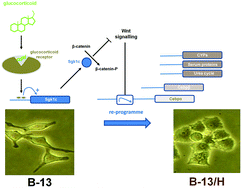The B-13 hepatocyte progenitor cell resists pluripotency induction and differentiation to non-hepatocyte cells
Abstract
The rat pancreatic “B-13” acinar cell is a stable progenitor cell line that differentiates into hepatocyte-like cells (B-13/H cells) in 2D un-coated plastic culture with simple culture media in response to glucocorticoid exposure. Examination of cytochrome P450 indicated that the expression of a range of genes were similar to freshly isolated hepatocytes and that these gene products were functional on the basis of spectrophotometrically-detectable reduced carbon-monoxide haemoprotein and metabolism of several drugs. Since normal hepatocytes readily de-differentiate under similar conditions, we hypothesized that B-13 cells have undergone a variety of alterations that stabilise a progenitor phenotype and restrict differentiation to hepatocytes only (which if capitulated in human cells, could generate a readily accessible supply of functional human hepatocytes in vitro). To examine this hypothesis, the B-13 karyotype; pluripotency-inducing transcription factor expression and forced over-expression of these factors in B-13 cells were examined. B-13 cells were also injected into NOD/SCID mice and engraftment and differentiation assessed by RT-PCR, Western blotting, immunohistochemistry and fluorescent in situ hybridization (FISH). B-13 cells expressed four pluripotency-inducing transcription factors c-Myc, Klf4, Oct4 and Sox2 with only c-Myc expression maintained after glucocorticoid treatment. Over-expression of the pluripotency-inducing transcription factors blocked B-13/H formation in response to glucocorticoid. Injection of B-13 cells into NOD/SCID mice resulted in their engraftment to the pancreas and liver, with restricted differentiation to hepatocytes in the liver. The cells did not engraft to any other tissues examined. The ability of B-13 cells to specifically generate functional hepatocytes in vitro in response to glucocorticoid is therefore associated with genetic rearrangements that may facilitate expression of genes associated with plasticity (without leading to pluripotency), which are repressed by glucocorticoid treatment.


 Please wait while we load your content...
Please wait while we load your content...